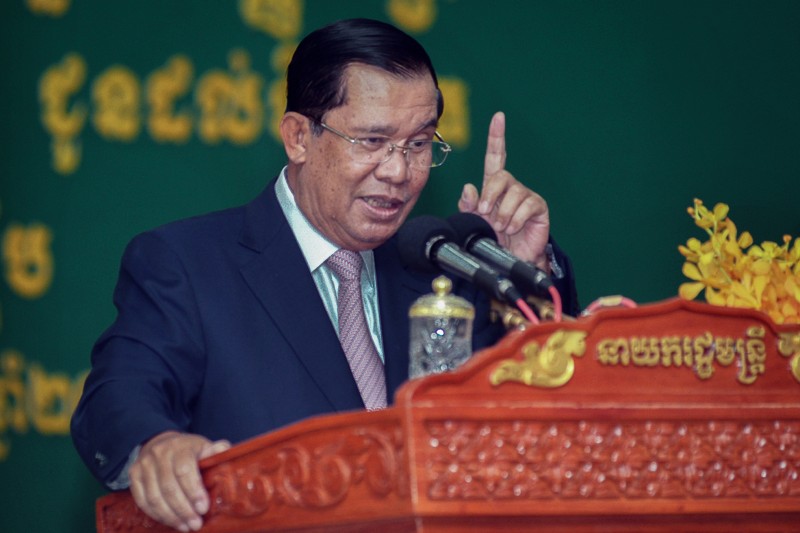With rain finally starting to fall across the country, Prime Minister Hun Sen on Wednesday declared an end to the relief campaign he launched last month to counter the worst drought in decades, calling the devastating dry spell an opportunity for “lessons” in governance.
“Today, on behalf of the government and as prime minister of the Kingdom of Cambodia, I’m announcing the end of the large-scale campaign…providing water for the population,” he said at a graduation ceremony at the National Institute of Education in Phnom Penh.

Early signs of the drought emerged with last year’s delayed start to the rainy season, which produced below-average rainfall before farmers were hit with one of the longest dry seasons in recent memory.
As canals, ponds and wells ran dry across the country last month, the premier launched a campaign to deliver water to those in the greatest need. One hundred military trucks carrying water were deployed to areas that rely on rainwater for everything from drinking to watering crops, while governors were ordered to stay in their provinces to help until monsoon season arrived.
“In the world today, there is nobody who can control the weather,” the premier told his audience on Wednesday. “I would like to take this opportunity to say that I admire all government forces’ participation in rescuing our people who were affected by water shortages.”
The prime minister said the unprecedented severity of the drought—which killed hundreds of livestock, forced cutbacks to school hours and drastically increased health concerns—would spur new efforts to mitigate the effects of a potential repeat of the extreme weather event.
“This year’s experiences and lessons give us a lot that we can use to prepare for long-term combat in the future,” he said, comparing this year’s drought to devastating floods in 2000 that led the government to alter the way roads and public buildings were constructed.
“The activities of digging new wells and ponds, restoring existing wells and ponds, as well as digging to create canals must continue,” he said.
Council of Ministers spokesman Phay Siphan declined to expand on the government’s future drought alleviation plans or say how much money would be spent expanding the country’s irrigation systems, referring a reporter to the Ministry of Water Resources.
Water Resources Ministry spokesman Chan Youtha could not be reached.
The U.N. Development Program (UNDP), however, said that while the current drought provided insight into the institutional changes Cambodia would have to undergo in order to prepare for future natural disasters, the country lacked the infrastructure to foresee such occurrences.
“The current drought does give an idea of the institutional challenges that Cambodia will have to deal with, in the face of climate change, over the coming decades,” UNDP Cambodia’s head of policy Napoleon Navarro said in an email.
A lack of Automatic Weather Stations or stations to measure river water levels made it impossible to provide sufficient and relevant forecasts, Mr. Navarro said.
“Such information is critical for generating advisor[ies] and guiding public action down to the provincial, district, and commune levels,” he said.
Additionally, he said, “no single ministry is able to translate these medium-term forecasts into specific public advisories/actions on water allocation and farming ahead of time.”
Opposition lawmaker Son Chhay said the government had long poured money into irrigation systems without getting proper results and should conduct research and work alongside experts to effectively prevent the same problems from recurring.
“They do not listen to the experts enough,” Mr. Chhay said, adding that the government should have been better prepared considering severe drought warnings were sounded early last year and acknowledged by the Water Resources Ministry, which said action was needed.
“But they didn’t do it, and they waited until the drought hit the people,” he said, adding that the efforts to deliver water to communities were politically motivated. “They just use this as a type of propaganda—this sort of providing clean water for drinking to the villages.”